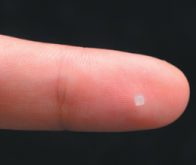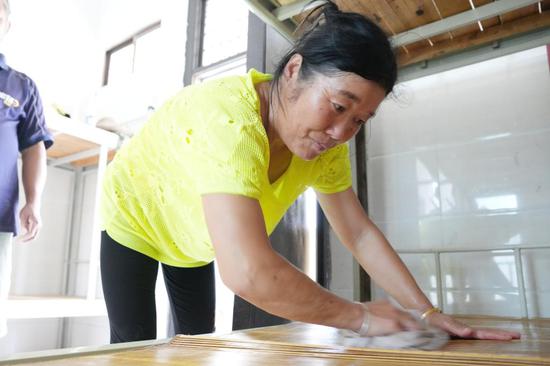
The sesame seed-sized, biodegradable brain sensor. (CHINA DAILY)
Chinese researchers have developed a sesame seed-sized, biodegradable and wireless brain sensor that could potentially transform the way brain conditions are monitored in patients with head injuries or tumors.
The conventional method used to measure intracranial pressure, temperature and other brain health barometers is inserting a wired sensor into the brain. Implantation and removal of the device require surgery, and openings left in the skin during monitoring increase the risk of infection.
To address these problems, researchers at Huazhong University of Science and Technology in Wuhan, Hubei province, along with those from Tong Ji Hospital in the city and Nanyang Technological University in Singapore, created a cubeshaped wireless sensor measuring 2 millimeters on each side.
The tiny tube can be injected under the skull through a needle and operated through an external ultrasound probe, eliminating the need for invasive operations and preventing infections.
Because the implant is based on a biodegradable material called hydrogel, it can eventually dissolve into harmless components.
Researchers tested the sensor in rats and pigs and found that it can perform as well as or even better than conventional wired sensors when measuring intracranial pressure and temperature. It remained stable for three to four weeks and degraded into harmless components after 18 weeks.
The results of their research were published by the international scientific journal Nature on June 5.
Zang Jianfeng, a professor at the university's School of Integrated Circuits who led the research, said the invention stems from years of research on the properties of hydrogel and flexible acoustic technology.
At the core of their innovation is making changes to the composition of degradable hydrogel so that it presents a periodically aligned air column structure. The material deforms in response to changes in its environment, which can be detected through an external ultrasound probe.
"We have so far carried out a large number of experiments, including animal tests, to examine its safety and biodegradability, and results are promising," he said.
Zang added that the team can make sensors of different sizes or shapes, based on demand.
"It could be a cube measuring 1 millimeter or several centimeters on each side, or a thin slice," he said.
He said the team's research is nearing clinical application, but more efforts are needed to deepen collaboration with doctors, test the sensor's effects in human bodies after rigorous ethical and technological review, and explore ways to use the technology on an industrial scale.
The size of the global market for traditional wired sensors, which mainly serve patients with brain tumors or trauma injuries, is about $390 billion.


















































 京公网安备 11010202009201号
京公网安备 11010202009201号